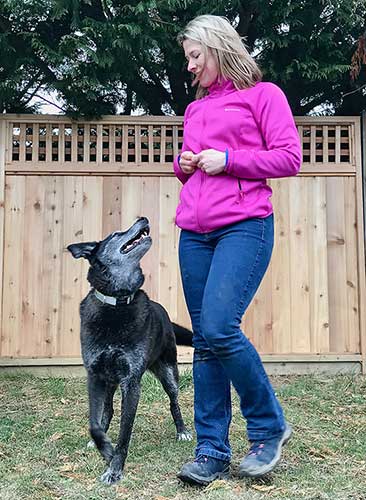Puppies bite. They are exploring the world with their mouths. Whether puppy biting becomes a problem is largely due to how we respond to it.

“Ouch, enough already. My puppy has become a monster. Make him stop!” said every new puppy parent.
Let’s get something clear. Puppies bite. They have incredibly sharp, needle like teeth so they can learn about the world. Thing is, this a very sophisticated evolutionary process. While sharp, those puppy teeth can’t cause the damage that an adult dog’s mouth can and so it’s rather important pup learns the power of his jaw before his adult teeth come in. Whether puppy biting becomes a nuisance issue however is entirely dependent on the way we respond to it. If you make an issue out of it, then puppy biting will become a much bigger problem. If we weather the storm on the other hand, most puppy biting should diminish when puppy starts losing those baby teeth.
“But have you seen my hands? They are so beaten up. Every time I play with puppy he gets this crazed look and starts going after me.”
Oh I hear you. But tell me, if it hurts, why exactly are you still trying to interact with pup in the same way?
All animals will do what works for them. If a behavior is rewarding, it will be repeated. Most puppies bite because that is what they are inherently primed to do at the age that people generally bring them home from a breeder – that is, at around 8 weeks they are beginning to explore the world using their mouth. Most puppies will have started losing their baby teeth by around 16 weeks and this “window” of time is when pup learns what happens when he uses his mouth. If he’s playing with another dog and one of them bites just a little harder than the other finds comfortable, the offending dog is quickly told “That hurt. I don’t want to play with you if you do that.” Watch them – there’s normally a shocked look by one of them, followed by some form of escalated vocalization, a pause in play, and then the jaw gnashing likely continues. Pup just learned that his mouth can hurt.

Puppies want (and need) to play – the purpose of play is considered to be a way to practice adult behaviors. So we have a situation where you want to play with your beautiful puppy, and he wants to play with you but his go-to game at this age involves his mouth. Houston, we have a problem.
Actually we don’t – if we know what to do. Rather than allowing any play that involves your hands, try redirecting puppy’s mouth onto a toy. Tug and fetch are easy to teach at this age as puppy will naturally want to interact with the object. Simply animate a toy, wait for pup to pounce and gently tug. Animate another toy and watch pup’s focus shift onto that one. You can toss it a short way away and watch pup run after it, or simply play tug with the new one. Rinse & repeat. Play these games with pup now and you’ll likely have a lifelong game you can play together.
What’s that? He keeps putting his mouth on you instead of the toy? Can you try a bigger toy? If not, time for the “puppy response” – tell pup it hurt and pause the play.
Yelling at your dog “NO!”, pinching his lip, pushing your fingers down his throat, holding his muzzle shut, rolling him on his back are not appropriate ways to tell pup it hurt. All of them involve a use of force or intimidation that will very likely scare puppy. Now you’ve become an unpredictable entity and chances are that pup will resort to more biting not less. What self-respecting puppy is going to let you come near his mouth if you’re going to hurt him? He’ll now be using his mouth to keep you away which is the last thing you want to teach your young dog.
The better way to respond to unwanted biting? Try starting with a neutral verbal response. By all means, use the word “no” but do so in a non- emotional way. Extricate your hand/sleeve/hair and redirect pup’s mouth on to a toy. Stand up and walk away if you can so play is paused. If pup’s biting continues, time for play with you to end. If you can leave pup in a safe confined area and take yourself out of the equation entirely, perfect. Maybe you can try and resume play after a few minutes but the message you’re sending pup is very clear – hurt me, and I won’t play with you. For most puppies, this is the last thing they want and they learn the lesson very quickly. For other pups, they may have learned from previous interactions with you that they can get much more excitement/attention from you if they persist. Remember what was said above about behaviors that work being repeated? Here’s that principle clearly at play – if puppy maintains his biting behavior, he is finding something rewarding about that activity. It is up to us to alter our response and stop doing whatever it is we are doing that leads to pup’s further biting. Sometimes tired and/or overexcited puppies just need to have a little time out.
Again, puppies do need to have an outlet for their mouths in this important developmental window. Ask yourself if pup is getting the right amount of exercise for his age – not too much or too little. Toys – have lots of them, and different types. Try and arrange playdates with other pups. Food puzzles like stuffed Kongs provide much needed mental stimulation while tug toys soaked in broth and then frozen can soothe a mouth aching from teething.
If you respond in the way recommended in this article, then most puppy biting will lessen. Change might not happen overnight, but if everyone interacting with the pup is consistent, the lesson can be learnt in days. There are exceptions and if you’ve truly tried “everything” then you may need some additional professional assistance. Force, intimidation and “corrections” however aren’t required to change a puppy’s biting habits and if a trainer tells you otherwise, don’t just accept that. Just like children, the manner in which you interact with a pup at this tender age is likely to have a long lasting impact. Please do be upfront with your chosen professional and describe carefully what responses you have already tried to end the biting. A good professional will have a solid understanding of learning theory and how consequences drive behavior and you should soon be on your way to healed hands.


